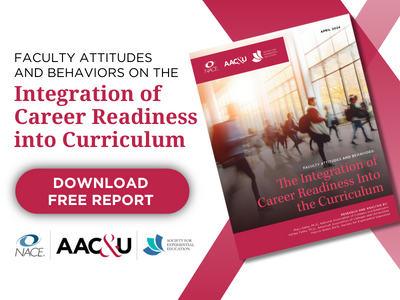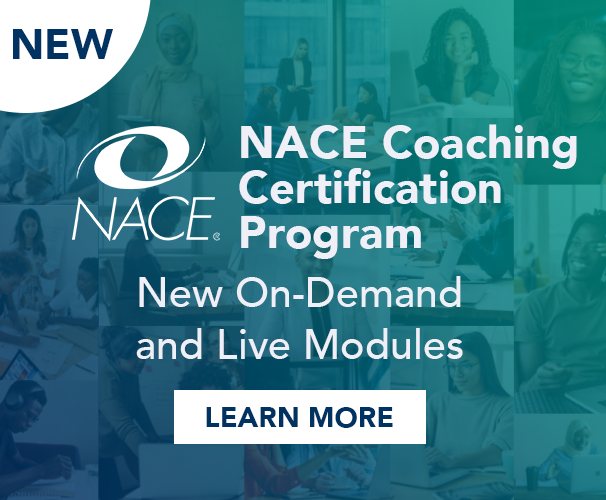NACE Journal / May 2022
There is a seemingly endless supply of tools and tips for helping the undeclared student figure out what they want to do with their life. This process is difficult for students, challenging them to develop self-awareness alongside visions for the future. For those who come into the university without a clear direction, the first weeks and months can be incredibly trying. Perhaps that’s why only 20.3% of students who spent at least half of their time undeclared make it to graduation.1
Career professionals can help students gain clarity by guiding them toward their passions, values, and places of purpose or meaning. Yet, even within these pursuits, there are a variety of methods for helping students discover and develop self-awareness. The challenge is often not just in knowing oneself, but in making decisions based on that knowing. The question really becomes, “How do we help these students make their major and career decisions?”
MBTI and Decision-Making
In an attempt to better understand the undeclared population, 272 undeclared students were administered the Myers-Briggs Type Indicator (MBTI). This assessment, widely used in a variety of circles, helps individuals understand four combinations of preferences. These dichotomies separate Introversion and Extroversion (I and E), Sensing and Intuition (S and N), Thinking and Feeling (T and F), and Judging and Perceiving (J and P).
The MBTI is based in Karl Jung’s theory of personality preferences, arguing that individuals prefer different ways of interacting with the inner and outer worlds (I and E), different kinds of information (S and N), different kinds of decision-making processes (T and F), and different ways of organizing their external world (J and P).
For understanding the decision-making process, we looked specifically at the differences between Thinking and Feeling types. While Thinking types prefer to focus on the discernable facts and figures—the objective truths about a situation—Feeling types prefer to consider how decisions may impact them and their communities—the subjective realities around them in the moment.
The 272 students were taken from the 2017-2020 undeclared populations at a private, Midwestern university. Of those, 212 reported a preference for Feeling over Thinking. This means that 78% of this undeclared population prefers to make decisions based on the subjective, on what “feels right” to them in the moment. The struggle for these students to make a decision becomes clearer based on this preference, indicating that these students are less likely to resonate with typical messages given by academic majors regarding their area’s benefits.
Undeclared Feeling Types and Decisions
Probing further into decision-making, we surveyed 84 of these students (72 Feeling and 12 Thinking) to better understand how they make decisions, focusing specifically on areas of calling, major, and career. Their responses indicate that there are notable differences, as well as a few similarities, between Thinking and Feeling types.
Thinking types looked for places where they could feel confident and capable. They focused on their places of ability as well as what experts in the field could recommend. Conducting informational interviews with those who have gone before them or those working in career fields gave them greater clarity over their potential paths.
Feeling types, on the other hand, made decisions through verbal processing and reflection, focusing on what they could understand from conversations with peers and advisers. The role of community played a large role in helping them find their chosen path, demonstrating the need for connection with Feeling types through their process.
Both Thinking and Feeling students found that passions offered them more clarity when discovering places of purpose and career direction. These were further developed by one-on-one conversations with a trusted adviser. Both types also saw importance in the conversations held in class about these topics and on the time given to them to reflect and process their learning.
Helping Students Decide
Undeclared students need help when it comes to making decisions regarding major and career. Developing a sense of purpose within these individuals can provide powerful direction and meaningful growth in self-awareness. Even then, students may need additional help making decisions based on what they know. For the majority of this population, more attention to the subjective is necessary in helping them commit with confidence to a chosen path.
Based on this understanding, we believe there are four places to focus on when guiding undeclared students to their majors and future careers.
Passions: Passions are a common place of meaning for Thinking and Feeling students when considering their future plans. Help students discover passions by identifying places of “flow.” Ask them to think about times when they lost all sense of time and just enjoyed what they were doing. Help them identify what they would be willing to sacrifice in terms of time, money, and energy to see accomplished in the world.
Discussion: Holding intentional conversations with undeclared students can help them reflect and process through places of self-awareness and articulate what they are feeling about a situation. Challenge them to identify their emotions and connect them to what they have felt when finding confidence in past situations. Put together small groups of undeclared students to create a community of learning to extend this opportunity for connection.
One-on-one conversations: While large- and small-group conversations are important and valuable for these students, conversations with a mentor or respected adviser can go a long way to giving them additional clarity. Give them affirmation and reassurance to help support their growing feelings of direction. Offer encouragement and gentle challenge that tap into their ability to make decisions in the moment.
Reflection: Feeling types need time to better understand how they process the information at hand. Encourage them to journal about how they feel about any given path, to intentionally reflect on their decision, rather than waiting for their trusted “gut instinct” to kick in.
***
While not every undeclared student is a Feeling type, our research has been showing a strong and stable trend in that direction. Addressing this population’s unique needs is a special opportunity that can help an underserved population better understand who they are and what they want to do in the world. It has the potential to demonstrate the value career services work to the realm of retention and persistence. Beyond that, we will serve our students more directly as we offer more personalized service to their Feeling-oriented needs.
Endnotes
1 Yue, H., & Fu, X. (2017). Rethinking graduation and time to degree: A fresh perspective. Research in Higher Education, 58(2), 184–213. http://doi.org/10.1007/s11162-016-9420-4.






